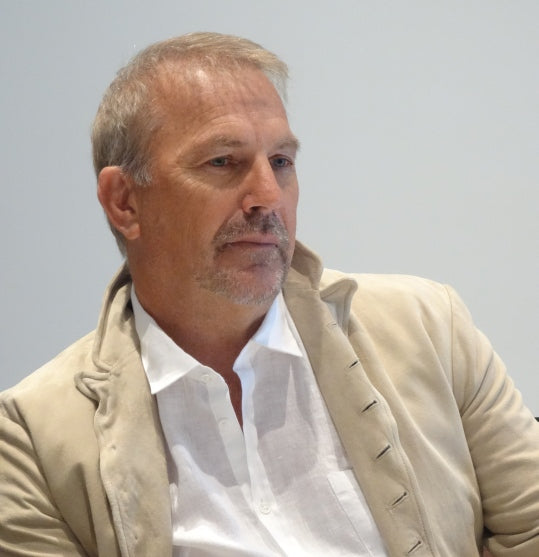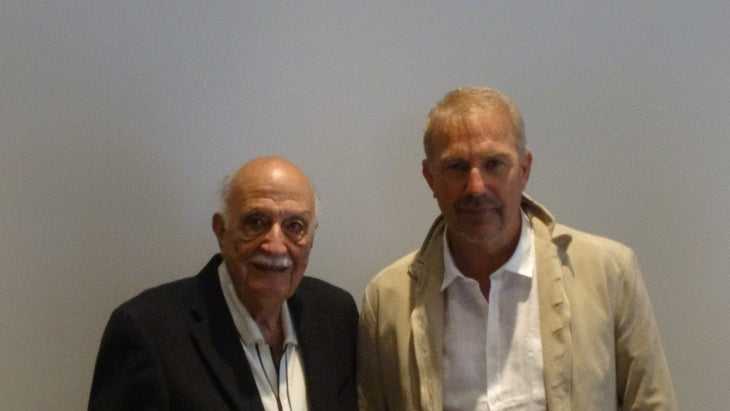


International star Kevin Costner tells Al-Mawed magazine: In my latest film about the rise of America, I did not flatter anyone and depicted the situation as it was between the Americans and the Red Indians.
*At the beginning of my career, I bought a small house in Mammoth Mountain, California, because I didn't have the money to buy a large plot of land.
*While I was staying in the most luxurious hotel in Paris and filming one of my most beautiful films, I felt a longing for my family.
The Hollywood art community is filled with rumors and news about the private lives of stars, to the point that this news has become normal for the public, but sometimes the art community is shaken by events and news that may have a stormy impact, especially when this news or scandals revolve around figures who have weight in Hollywood. Recently, a woman accused producer "Harvey Weinstein" of raping her, and the Public Prosecution opened an investigation into this accusation. After that, several women claimed that Harvey Weinstein raped them, and he was suspended from working in the studio that he and his brother established. Harvey was scheduled to produce a film that was nominated to star "Kevin Costner".
But Paramount Studios managed to produce the film without Harvey Weinstein. The film is very beautiful, whether through the natural scenery, the good acting, or the story that tells the history of the United States of America and the war of the Americans against the Red Indians and the colonists’ seizure of the Indians’ lands and the wars that took place at that time.
Kevin Costner was born into a modest family in Los Angeles and began his career as a fisherman, then a truck driver, then a tour guide in Hollywood. However, his passion for singing and music began at a young age, where he learned to play the piano and church hymns. He then went to university to obtain a Bachelor of Commerce degree, but his love for acting and cinema led him to play some small roles, and from there he devoted himself completely to acting until he reached stardom.
I asked him what he liked about Yellowstone, the last movie he acted in... He said that this movie is a Western, but he never hesitates to act in movies that are shot outside the studio in nature and among the trees. He also likes movies in which he rides horses. "The horse is a beautiful animal that follows the instructions of its rider and gives him freedom of expression. Now that I have made more than two hundred movies, I have the right to choose the movies that I want to act in, as well as those that tell the story of America in its early days and the difficulties that the first colonists faced." Then he continued, saying, "Who doesn't want to be on a horse? Who doesn't want to cross a small river on a horse? All of this is what attracts me to Western movies and their beauty." I asked him about the difference between the early days in America and now in terms of security and protecting his family, and he said: “The way people used to protect their money, land and family has completely changed. In the past, you would go and kill anyone who encroached on your land, for example, but now you cannot do that, as the law and the police are among their duties to solve these problems. But the way to protect your family has changed, even if the goal is the same. I would like to show that on screen and transport the viewer from his current time to a distant time, and transport him from the huge buildings and crowded cars in the streets to wide lands and tall trees and a different means of transportation with horses and cows. If I can do that, I will have succeeded in my message.”
I asked him: How would you describe yourself? A modern man or a man who loves and responds to the days that have passed and will never return? He said: “I love nature, as I mentioned, and I built three small boats myself and crossed two rivers in these boats. You can describe me as a reactionary man or a modern man, I don’t care.”
I asked him, “Did you raise your children to love nature or modern life?” He said, “I expose them to both images and both lives and leave them to choose according to what they desire.”
I asked him: If you love the land so much, did you buy any land? He said: “My love for the land made me buy a small kiosk in the mountain when I was a beginner because I didn’t have enough money to buy any land. So I bought the kiosk in Mammoth Mountains in California. My wife and I go there whenever we get the chance and fortunately my wife also loves the life away from the city and its noise.”
I said to him: You have everything: fame, wealth, and family. What do you want to have that you lack? He said: “This is a big question. Every person lacks something, no matter how complete their life is. For example, I was in France one day to shoot a movie. I was in a luxurious hotel and everything was fine, but suddenly I felt that I was missing my family, my wife and children. Every person lacks something, no matter how complete their life is.”
I told him: Most of your films are about Indians and you tend to favor them. Is that true? He interrupted me and said: “I tried to portray the situation as it is, without favoritism or slippage between the Americans and the Red Indians. I portrayed them as they were, from their clothes and the tattoos on their faces and their lives as we know them, as well as the treatment they received from the army forces at the time and their dedication to defending their land.
Hollywood - George Doss

